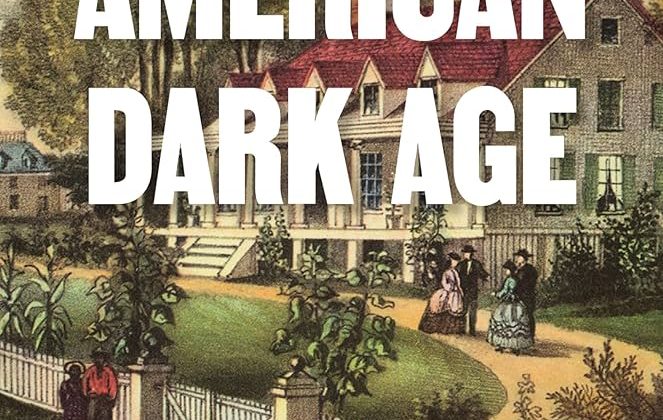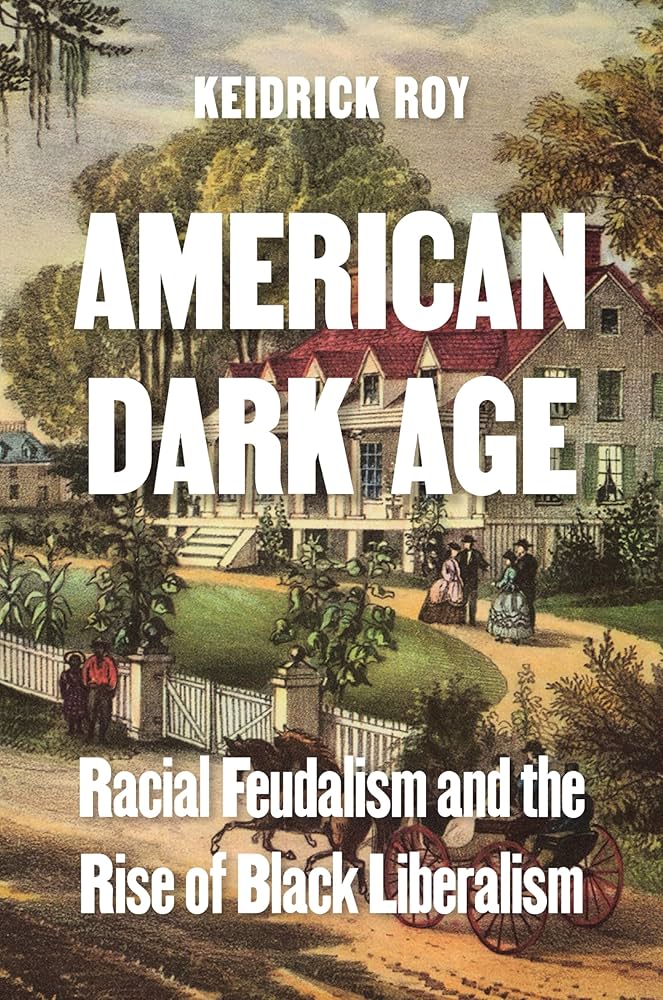

Keidrick Roy is a Junior Fellow at the Harvard Society of Fellows. This interview is based on his new book, American Dark Age: Racial Feudalism and the Rise of Black Liberalism (Princeton University Press, 2024).
JF: What led you to write American Dark Age?
KR: American Dark Age emerged from a broader set of questions I began thinking about six years ago surrounding African Americans’ reception and transformation of eighteenth-century Enlightenment ideas. Jefferson’s Map, Douglass’s Territory: The Black Reconstruction of Enlightenment in America, 1773-1865 became my dissertation and the foundation for my next book. While working on that project, I grew increasingly interested in the reported “medieval” underside of Enlightenment concepts. I found that many Europeans and Americans clarified their vision of Enlightenment by pointedly contrasting the movement’s ethos with erstwhile traditions that propped up unjustified social, political, and clerical hierarchies. They believed such arrangements emerged from a benighted or “feudal” past that no longer comported with what they empirically understood about the nature of the world and the essence of humanity.
During the course of my research, I noticed that both black and white Americans depicted life in the United States using feudalistic metaphors, despite the contentions of figures such as Thomas Jefferson, who claimed to have abolished the remnants of “feudalism” from their corner of the New World. While antebellum supporters of slavery and racial subordination invoked medieval social hierarchies to justify racial stratification in the United States, antislavery thinkers—especially black abolitionists who faced slavery and prejudice—railed against what they portrayed as remnants of feudalism and the medieval world. American Dark Age tells their stories and—in its capacity as a work of political theory beyond its intellectual historical foundations—offers a vision for the future of American politics rooted in their transformation of liberal ideas.
JF: In 2 sentences, what is the argument of American Dark Age?
KR: American Dark Age examines what it meant to be an enlightened “liberal” in the United States before the twentieth century and shows how prominent African Americans reimagined the nation’s political tradition through their critiques of what W. E. B. Du Bois called “American feudalism.” Redefining liberalism by way of feudalism—its ideological antithesis—creates the space for diagnosing the power and persistence of racialized medievalisms in American society since the founding era.
JF: Why do we need to read American Dark Age?
KR: Reading American Dark Age will shed light on a collective of black and white intellectuals who described their experience in the United States as an extension of the medieval world. In addition to new readings of familiar figures such as Thomas Jefferson, Charles Pinckney, George Fitzhugh, Frederick Douglass, Harriet Jacobs, Frances Ellen Watkins Harper, and David Walker, it also sheds light on the anti-feudal, liberal ideas of lesser-known figures such as Hosea Easton (an early black philosopher), Maria Stewart (an outspoken abolitionist who was exiled from Boston), Nathaniel Paul (an early black preacher who claimed enslaved people were “in a state of unconditional vassalage”), William Wells Brown (author of the first novel written by an African American who asked if slaveholding Americans should be “behind those who are represented as almost living in the dark ages”), and James W. C. Pennington (coiner of the term “chattel principle” and decrier of American slavery as “an institution of the dark age”). The book will also highlight how proslavery thinkers and abolitionists characterized slavery and racial hierarchy in terms of medieval social arrangements for vastly different reasons.
Ultimately, American Dark Age will orient readers to how influential Americans understood the nation’s relationship to the Old World and medieval societies. They will learn how African Americans’ distinctive liberal framework, among other things, opposed the illiberal expulsion of black people from the United States, favored reform over revolution (except for the abolition of slavery), maintained an identity-aware as opposed to an identity-blind or identity-driven ethical disposition, and emphasized national political transformation through moral improvement. They nurtured a spirit of cautious optimism as they worked to initiate new ways of knowing and being “American” that remain instructive today.
JF: Why and when did you become an American historian?
KR: I began my journey as a student of literature and philosophy at the Air Force Academy in Colorado Springs. I migrated to intellectual history and political theory during my subsequent eight years in the military and throughout my doctoral research. I am immensely grateful to my advisors and colleagues in Harvard’s American Studies program for allowing me to enrich my historical questions with the perspectives and methods of other disciplines. The training and support I received were indispensable for writing this interdisciplinary book—I delighted in nearly every moment.
JF: What is your next project?
KR: My next monograph—Jefferson’s Map, Douglass’s Territory: The Black Reconstruction of Enlightenment in America—widens the aperture from my focused analysis of feudalism and liberalism to explore the broader implications of Enlightenment ideas and their profound effects on the culture, laws, and political economy of the United States. It unveils how black Americans, in particular, reconceptualized familiar Enlightenment notions of reason, science, universalism, and progress through their seamless synthesis of revealed knowledge and rationality as well as their lived experiences in slavery and freedom in the aftermath of modernity.
JF: Thanks, Keidrick!

